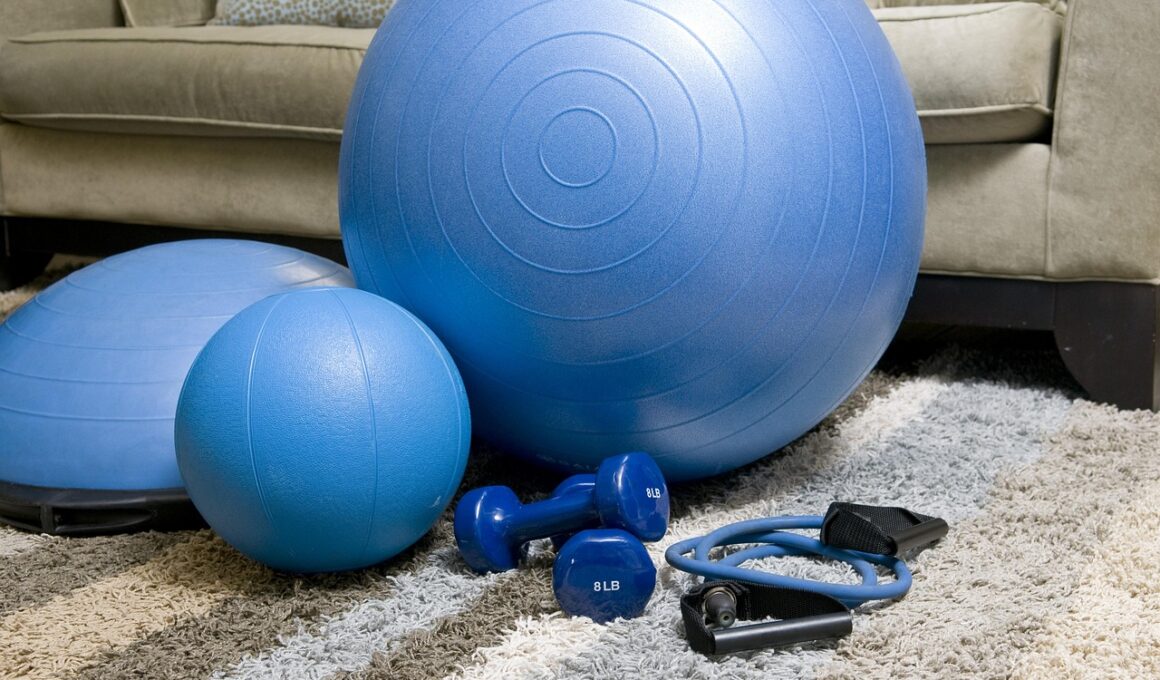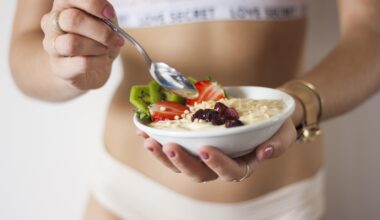How to Fuel Your Body for Optimal Performance with Resistance Bands
When utilizing resistance bands for workouts, the significance of nutrition cannot be overstated. Nutrition serves as the foundation for performance, helping you maximize the effectiveness of your exercises. Incorporating a variety of nutrient-dense foods into your diet ensures sufficient energy levels for your workouts. This can lead to improved resistance band routines and overall fitness. Among the essentials, carbohydrates play a vital role as they provide the primary source of energy. Focus on whole grains, fruits, and vegetables that replenish glycogen stores, enhancing endurance. Additionally, protein is indispensable for muscle recovery; include lean meats, legumes, or dairy in your diet. Healthy fats should not be ignored; nuts, avocados, and oils support overall health and aid in digestion and hormone production. Lastly, maintaining proper hydration is crucial for peak performance. Aim to drink plenty of water throughout your day and during workouts. An optimal balance of these food groups will set you up for success and maximize your resistance band workouts. Whether your goal is strength training or endurance, a solid nutrition plan tailored to your individual needs is essential.
Before starting your resistance bands workout, it’s vital to consider pre-workout nutrition strategies. Eating the right combination of foods before exercising can significantly impact your performance and recovery. Ideally, you should have a meal or snack rich in carbohydrates and moderate in protein. Carbs serve as fuel for your intensifying workout, providing sustained energy. Include options like a banana, oatmeal, or a whole-grain toast with nut butter that are easily digestible and full of nutrients. Consuming these foods approximately thirty to sixty minutes before working out can enhance endurance and performance. However, avoid large meals or high-fat foods that may cause sluggishness. Additionally, consider including a source of hydration beforehand. Drink water, or even a light electrolyte beverage if your session exceeds an hour. This prevents dehydration and optimizes your physical performance span. Remember, everyone’s body reacts differently, so experimentation is essential to find what feels best for you. The right pre-workout nutrition positively influences energy levels, stamina, and focus, allowing you to get the most out of your resistance bands session. Tailoring your diet can set the stage for achieving your fitness goals.
Post-Workout Nutrition for Recovery
After an intense resistance bands workout, your body’s recovery is crucial to your overall fitness regimen. The correct post-workout nutrition minimizes muscle soreness and aids in the rebuilding of tissues. It’s essential to target the replenishment of glycogen stores and repair muscle fibers within thirty to sixty minutes post-exercise. A balanced meal or snack should ideally contain a mix of carbohydrates and high-quality protein. Foods like Greek yogurt with fruit, a protein smoothie, or chicken wraps with veggies serve as perfect options. Carbohydrates enhance muscle recovery while protein provides the amino acids necessary for repairing muscle damage. Incorporating antioxidants, such as berries or dark leafy greens, can further support recovery by reducing inflammation. Remember to hydrate adequately after your workout as well; the loss of fluids should be remedied with water or an electrolyte beverage. Rest and recovery are equally important components like the workouts themselves. Hence, focus on good nutrition during this post-exercise recovery phase. Implementing these strategies allows you to optimize results and recover efficiently after resistance bands workouts.
Another crucial aspect of dieting with resistance bands is timing your meals throughout the day. It impacts not only your performance during workouts but also how your body uses the nutrients you provide. Spreading your meals evenly helps in maintaining consistent energy levels, preventing fatigue. Consider having smaller, more frequent meals rather than relying on few large meals. This approach keeps your metabolism active and supplies your body with a steady stream of energy, particularly vital for demanding workouts. Including healthy snacks like nuts, fruits, or yogurt between meals provides an energy boost when needed. Timing can also revolve around your resistance bands sessions. Having a small meal or snack two to three hours before and replenishing afterward is optimal. This structure helps you stay energized and alert during workouts. Above all, listen to your body’s cues. Understanding when you feel most energized and adjusting your meal timings accordingly is crucial. An adaptable approach to meal timing will help you realize your full potential in utilizing resistance bands effectively, maximizing the gains you experience from these workouts.
The Role of Hydration in Resistance Bands Workouts
Hydration plays a fundamental role in ensuring optimal performance during resistance bands workouts. Water is essential for regulating body temperature and lubricating joints. Dehydration can significantly impair your strength, endurance, and overall performance. Therefore, it’s crucial to monitor your hydration levels throughout the day. Drinking ample water before, during, and after workouts helps maintain fluid balance. During intense sessions, relying solely on water may not be sufficient; electrolyte-rich drinks can prove beneficial if workouts exceed an hour or are particularly strenuous. For effective hydration, consider carrying a water bottle and taking regular sips instead of waiting until you’re thirsty. It is often advised to consume water about 17 ounces two hours before exercising further, continuously sipping throughout your workout. Post-exercise, ensure to replenish lost fluids and minerals to facilitate recovery. Additionally, assessing the color of your urine can guide your hydration levels—aim for a light yellow hue to stay adequately hydrated. Ultimately, focusing on hydration supports your resistance bands routine, enhancing performance and recovery while reducing the risk of fatigue or injury.
A well-rounded micronutrient profile is just as vital as macronutrients for anyone involved in resistance band workouts. Vitamins and minerals contribute essential roles in energy production, muscle contraction, and nerve function. Cruciferous vegetables, fruits, lean meats, and whole grains should be cherished staples in your nutrition strategy. Pay special attention to key micronutrients such as Vitamin D, calcium, magnesium, and zinc. These play crucial roles in muscle and bone health, particularly when engaging in strength training with resistance bands. Including diverse foods ensures you receive a broad spectrum of vitamins needed to support bodily functions. Additionally, a focus on Omega-3 fatty acids can enhance recovery and reduce inflammation. Foods like fish, flaxseeds, or walnuts offer beneficial sources. Prioritize a colorful plate; a vibrant array of fruits and vegetables indicates a wider range of nutrients in your diet. Whenever possible, strive for whole foods over supplements, as they provide synergistic compounds that work together for better results. Tailoring your diet for resistance band training not only boosts performance but improves overall health and wellness in the long run.
Supplementing Your Nutrition Plan
While focusing on whole foods is essential, certain supplements can enhance your resistance bands workout results. Effective supplementation can bridge any nutrient gaps in your diet. For those striving for muscle gains or enhanced recovery, protein powders such as whey or plant-based options can serve useful. Consuming these after your workout can significantly assist in muscle repair and growth. Creatine is another popular supplement that has been shown to improve strength and performance in resistance training. However, it’s vital to ensure that any supplementation aligns with your specific dietary needs and fitness goals. Before introducing supplements, consult with a healthcare professional or a nutritionist to assess what may be necessary and beneficial for your individual circumstances. Be cautious against over-reliance on supplements; they should complement a well-planned diet, not replace it. Shop around to ensure quality and effectiveness, opting for reputable brands. Staying informed about your choices can lead you toward nutritional strategies that enhance your resistance band routines and promote overall health.
In conclusion, fueling your body effectively for optimal performance with resistance bands entails a holistic approach to nutrition. Each element—macronutrients, meal timing, hydration, micronutrients, and supplementation—plays a vital role in maximizing efficiency in your workouts. Invest time in planning and preparing your meals, focusing on whole, nutritious foods that support your energy needs. Make informed choices about what to eat before and after workouts, tailoring your diet to your specific fitness goals. Don’t overlook the importance of staying hydrated, and monitor your fluid intake diligently. Understanding how micronutrients contribute to overall health provides a solid foundation for resilience and performance. Emphasize a diet that not only supports your workouts but enhances your general well-being. Incorporating these nutritional principles into your routine will help you reap the benefits of resistance training significantly. With consistent practice, your performance will improve, leading to greater enjoyment and satisfaction in your fitness journey. Stay diligent in your nutrition plans, adapt, and celebrate your progress. Achieving your fitness targets is a journey, and nutrition is a cornerstone of that path.


